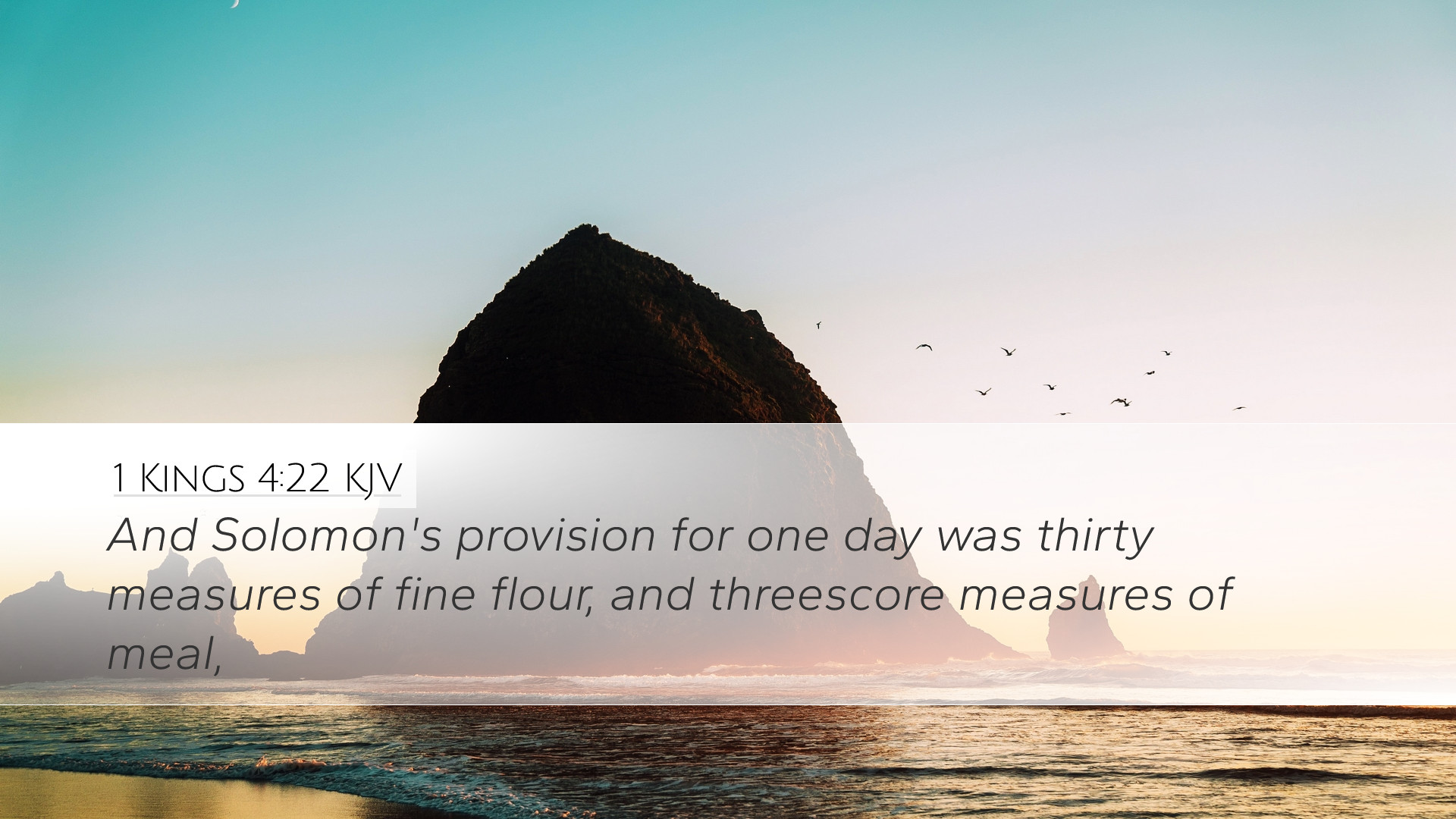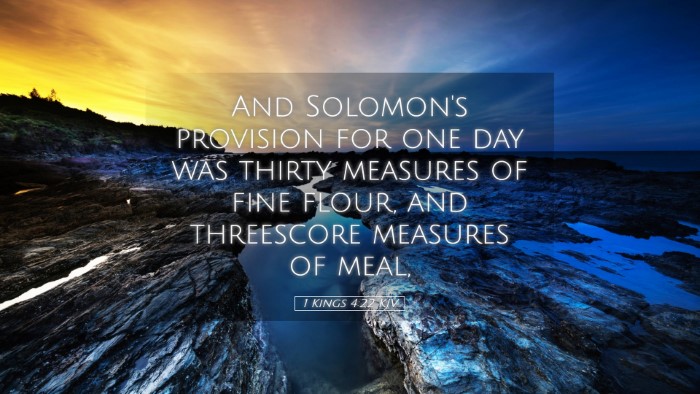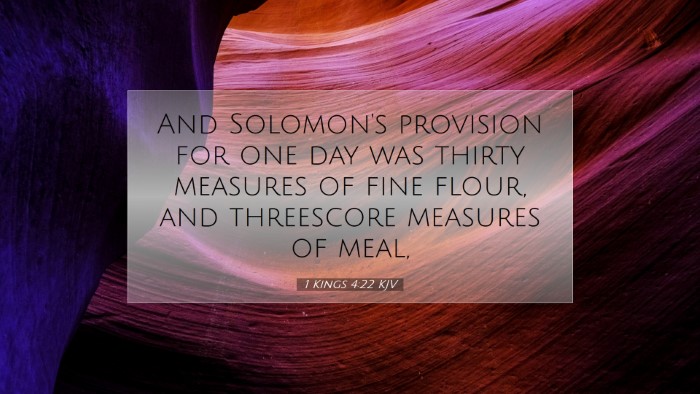Commentary on 1 Kings 4:22
Text of 1 Kings 4:22: "Solomon’s provision for one day was thirty measures of fine flour, three score measures of meal,"
Introduction
The verse in focus, 1 Kings 4:22, provides a glimpse into the wealth and administrative wisdom of King Solomon during his reign. The context of this passage highlights Solomon’s provisions, showcasing the prosperity of the kingdom of Israel under his rule. Key public domain commentaries, including those of Matthew Henry, Albert Barnes, and Adam Clarke, impart valuable insights that deepen our understanding of the implications of Solomon's provisioning.
Exegesis and Insights
Matthew Henry's Commentary
Matthew Henry reflects on the grand scale of the provisions made for Solomon's household and court. He indicates that such quantities illustrate not only Solomon's wealth but also his capacity as a king who could sustain a large following. He elaborates that "these were not only for himself but for his court, which was a great one," (Henry, Commentary on the Whole Bible). This underscores the importance of provision in the functioning of a royal household, drawing a parallel to God’s provision for His people.
Furthermore, Henry emphasizes the organizational aspects of Solomon’s reign, noting that allocating such resources reflects wisdom and foresight. His management of these resources indicates a structure in governance that fosters prosperity. Henry concludes by stating how this reflects a divine blessing on Israel, reiterating that wealth isn't merely for self-indulgence but can serve the welfare of the public.
Albert Barnes' Notes
Albert Barnes elucidates the specifics of the measurements provided in the verse. He interprets the "thirty measures of fine flour" and "three score measures of meal" as indicators of the extensive daily needs of Solomon's household, which would have included not only the royal family but also the officials and servants necessary for palace life. Barnes notes that "the quantities are enormous, and they speak of the extreme wealth and luxury of the court of Solomon," emphasizing that this abundance serves to authenticate the narratives of Solomon's unparalleled riches.
Moreover, Barnes connects this extravagant provisioning to God’s covenant with Solomon, where wealth and wisdom were promised. He leads readers to reflect on the spiritual implications of wealth, suggesting that material overflow should inspire gratitude and responsibility rather than arrogance or excess.
Adam Clarke's Commentary
Adam Clarke offers a detailed analysis of Solomon's administration, focusing on the physical and socio-political implications of the provisioning stated in this verse. Clarke draws attention to the structured nature of the provision system, hinting at a well-organized state apparatus under Solomon's command. He points out that the use of "fine flour" and "meal" suggests not only culinary distinction but also a cultural significance attached to feasting in royal gatherings.
Clarke also discusses the societal context of such largess, reflecting on how it provides insight into the normalcy of surplus and the expectations of royal patronage in ancient Israel. He underscores that this provisioning could serve as a means of hospitality and unity among various tribes and officials, emphasizing that Solomon's leadership was not only political but also communal.
Thematic Reflections
Provision and Divine Grace
The verse offers a profound testament to God's grace manifested in earthly abundance. The provisions speak to the faithfulness of God in providing for His people, as seen in the prosperity of Israel under Solomon's kingship. The quantity and quality of provisions invite the reader to consider how divine blessings can be internalized in a way that benefits the larger community.
Leadership and Responsibility
From these commentaries, we derive insights into effective leadership that prioritizes communal needs over personal excess. Solomon’s ability to manage such vast resources demonstrates the qualities of foresight, strategic planning, and accountability that should characterize any leader. These are qualities that pastors, theologians, and students of theology can extract as principles for modern-day leadership.
Wealth as a Tool for Greater Good
The analysis invites reflection on the nature of wealth. Wealth, as depicted in Solomon’s reign, is not an end but a means through which broader societal needs can be met. This challenges readers to understand their own resources and wealth within the context of service, outreach, and community enhancement.
Conclusion
In summary, 1 Kings 4:22 provides a rich tapestry of insights relating to divine provision, effective leadership, and the responsible use of wealth. The combined perspectives from Matthew Henry, Albert Barnes, and Adam Clarke remind us that Solomon's earthly splendor serves as both a historical reflection and a spiritual metaphor. This passage encourages scholars and students alike to explore the depths of biblical texts and apply their teachings to modern contexts of faith and leadership.


